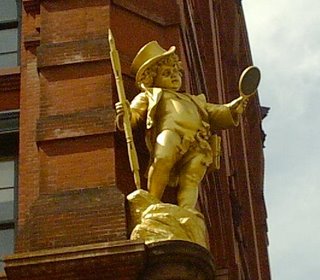
Friday, November 03, 2006
The Daily Hump: Go puck yourself

If you've been keeping up with the site this week you'll know that bogeyman and bugaboo share a common root, the Welsh word bwg, meaning "ghost" (see also bugbear). Related to bwg is the Welsh pwca, best described as a fiend or ghoul.
 From pwca we get the English word puck. Pucks were a class of pre-Christian nature spirits common in popular English superstition. It was during the 16th c. that a puck became the Puck (note capital P), identified alternately with the devil or a trickster-like sprite. By the time Shakespeare authored A Midsummer Night's Dream in the mid-1590s the identities of Puck and Robin Goodfellow (first cited in 1531 per OED) were so indistinguishable from one another as to render their names interchangeable.
From pwca we get the English word puck. Pucks were a class of pre-Christian nature spirits common in popular English superstition. It was during the 16th c. that a puck became the Puck (note capital P), identified alternately with the devil or a trickster-like sprite. By the time Shakespeare authored A Midsummer Night's Dream in the mid-1590s the identities of Puck and Robin Goodfellow (first cited in 1531 per OED) were so indistinguishable from one another as to render their names interchangeable.Fairy: Either I mistake your shape and making quite,Interestingly, these lines also reveal a third name, Hobgoblin. In their common noun form hobgoblins*, like pucks, are mischievous imps. The prefix hob- was a familiar by-form of the name Rob. It's not surprising, since the word hobgoblin likely came from Robin Goblin, which of course is a reference to Robin Goodfellow.
Or else you are that shrewd and knavish sprite
Called Robin Goodfellow...
Those that Hob-goblin call you, and sweet Puck,
You do their work, and they shall have good luck.
*For more on goblins see my gremlin post
William Shakespeare's A Midsummer Night's Dream [U of Oregon]
Robin Goodfellow [Wikipedia]
Hobgoblin [Wikipedia]
Puck [Wikipedia]
Labels: Shakespeare, The Daily Hump, Welsh Gaelic
:: posted by David, 8:17 AM